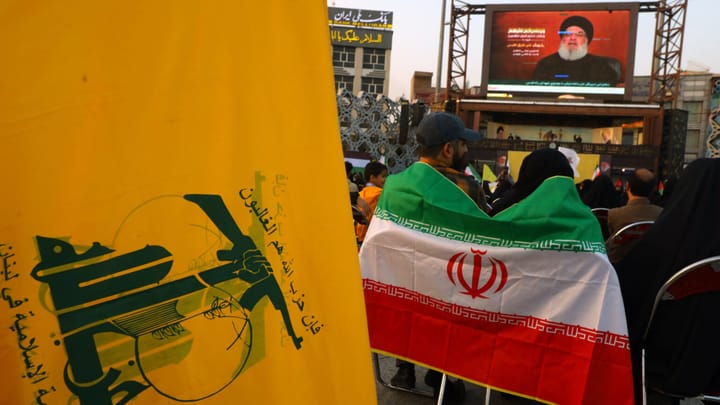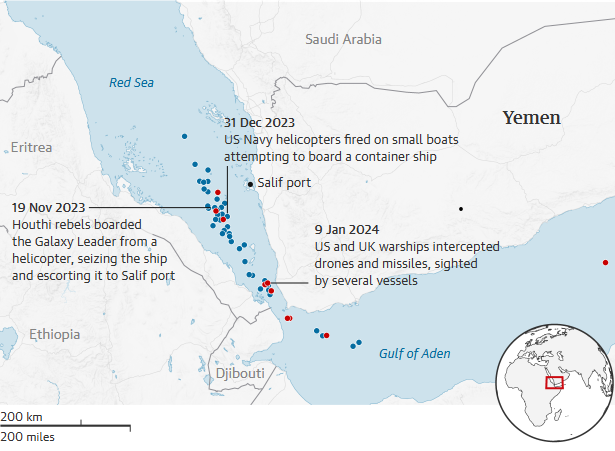The Biden Administration's Foreign Policy Blunders, Part 1: Emboldening the Houthis by Limiting the Saudi-Led Intervention in Yemen

At this time, at the end of October 2024, US Secretary of State Anthony Blinken is in Israel for the 11th time since the October 7 attacks. No one can remember the last time a US Secretary of State traveled so frequently to a region with little to no success as this one. On this trip, Blinken's main mission is to tell Israel to provide aid to Palestinians or risk cuts to US foreign aid to Israel at this time of tension and war. Everyone knows that this mission, like all others, will come to naught. This reflects a cycle of constant idealism and unrealistic goals set by the Biden Administration. In this article, the pattern of behaviors that culminated in Biden’s failure to maintain America’s leadership of the global order will be traced in relation to the 2021 limits the Administration placed on Saudi Arabia at a crucial time in the GCC intervention in Yemen.
Biden’s Moral Leadership Strategy & Betrayal of Old American Allies
In February 2021, US President Joe Biden announced an end to America’s support for the Saudi-led offensive operations in Yemen. This was two months before America withdrew from Afghanistan in one of the most disastrous US pullouts from a war zone.
Thus, early 2021 marked a watershed moment in the Biden Administration's foreign policy strategy. They moved into a global strategy of "moral leadership" aimed at accepting more refugees and trying to rebuild the world through peace.
On hindsight, the new moral leadership strategy of Biden has failed completely. The world has not had as many armed conflicts as it has had since 1946. This is attributable to the untested and unrealistic moral leadership strategy America introduced in early 2021.
Hostile forces are emboldened.
Russia attacked Ukraine less than a year after Biden started this official moral leadership policy.
Traditional allies who kept the peace in different regions of the world are disempowered. And now, as this article is being crafted, Russian is leading a BRICs summit which has involved many unlikely candidates, some of them staunch former US allies like Saudi Arabia, Turkey, and the United Arab Emirates.
The clear implication is that former US allies do not feel they can rely on Washington anymore.
Geostrategically, it is clear that Vladimir Putin is seeking to unite significant nations to build a new global order in the power vacuum created by Biden’s failed leadership of the global order.
What this means is that America’s control and ability to steer the global order has been weakened. Going forward, authoritarians are likely to rise and erase all the gains this White House has sought to attain.
What the 2021 Withdrawal for the Saudi-led Coalition Means in Geostrategic Terms
Biden's end of support for Saudi Arabia and the GCC was a sign that the tide was turning, and America was now a conditional ally to its long-term allies in the Gulf monarchies. For many years, these countries received aid from the United States without question. They stayed faithful as Cold War allies to the US and played crucial roles in global stability during the War on Terror. This meant many of these states turned their backs on their own brothers to comply with international anti-terror controls.
The decision to stop funding and supporting the Saudi-led coalition in Yemen was a major blow. It had a deep significance by way of showing the Gulf monarchies that their relationship with the United States was conditional.
In fact, the Biden Administration had options. This included demanding changes in operational policies and easing suffering in the region. Instead, the Biden White House overlooked all these possibilities and issued an all-out end of American support to the GCC intervention in Yemen.
The decision was disgraceful and shattering.
Furthermore, the reason cited for it was the humanitarian and strategic catastrophe caused by the military efforts.
This has turned out to be worse than what the Biden Administration sought to achieve.
Backfiring of the Moral Leadership Strategy & The Rise of the Houthis
Yemen remains a divided country. The armed groups are in a stalemate – sometimes, on a street-to-street basis, with one militia holding one side of a town and the other on the other side of the street. Yemen is waiting to explode into an ugly, destructive civil war.
The humanitarian crisis has gotten worse because the armed groups on both sides make everything more difficult. There can be no consensus under the current conditions. Yemen now resembles Somalia in the 1990s.
The current condition can only be resolved if one party wins decisively in the military sense and establishes a government. Saudi Arabia and its allies were closing in, and with the necessary support, they could have ended the violence and incubated a more viable state in Yemen.
Unfortunately, the humanitarian crisis continues. The killings and abuses continue in Yemen.
Geostrategically, Yemen has become more problematic in terms of world trade and peace. The attacks of the Houthis continue to destabilize the Red Sea region, and shipping costs have shot up. This is a group that would have been contained if there were Saudi-led troops on the ground. However, the naïve policy of the Biden Administration unleashed them to destroy the global order.
Houthis & Israel – Yemen Could Get Far Worse Than the Intervention Days
Yemen is the tenth poorest country in the world[1]. It is the poorest country in Asia and is at the same level as some of the most deprived countries in Sub-Saharan Africa. Yet, the Houthis continue to invoke religious ideals to fire Iranian-made drones against Israel.
Judging by the sophistication of the bombs used by Israel in Lebanon and Gaza, it is apparent that Israel can cause a lot of damage to the handful of essential infrastructure in Yemen. This could cause more humanitarian suffering in Yemen than the Saudi-led intervention. Thus, Yemen is on the verge of a bigger risk than what existed under the Saudi-led coalition.
Central Failure of Biden – Naïve Invocation of Diplomacy & Emergence of Iran
When Biden was inaugurated in January 2021, he said that “diplomacy is back at the center of America’s foreign policy”.
This was a naïve position that should have been sensitive to troubled regions around the world. There is no way the Houthis, Hamas, or Hezbollah can understand diplomacy. They are not states or credible international negotiation partners. Therefore, the attempt to use diplomacy in such regions was simply misplaced.
While Iran might appear as a state, its ideology involves using international order as a means to achieve a fundamental ideological end. Iran's end game is to export their brand of Islam around the world. They may sign an agreement or give diplomatic assurances – however, their end game is to destabilize the world, overthrow the current international order, and establish systems that meet their expansionist agenda.
Sadly, Biden started talking to Iran in April 2021 about the possibility of reviving the nuclear deal. This gave impetus for Iran to expand its scope in the region. The quiet period between 2021 and 2023 saw Iran working behind the scenes to expand its military influence on the ground. Under Trump, Iran was highly restricted. However, Biden’s naïve policy of reviving the Obama-era relations with the Iranian regime caused them to become emboldened and also destabilize the region further. This explains how and why the Houthis, led by a core of a small tribe, now have ballistic missiles to fire at Israel or Saudi Arabia.
Conclusion
The Biden Administration's "moral leadership" principle and "diplomacy-oriented" foreign policy have shown to be naïve and ineffective. Cutting support to Saudi Arabia in Yemen was the first symptom of this policy's failure. It was a betrayal of America's long-term allies in the Gulf monarchies. This explains why they have parted ways with Washington on many issues and now attend BRICs summits – something that was inconceivable a decade ago. Biden's over-reliance on diplomacy with no compelling imperatives created the gaps that led to the Russia-Ukraine war. It showed there would be no consequences for bad behavior, and America's traditional allies were disempowered. This caused problematic actors like Hamas, Hezbollah, and the Houthis to rise and destabilize large portions of the world. The Houthis, in particular, were emboldened by the Biden White House's withdrawal of support for Saudi Arabia and the Gulf states. This has left Yemen in a worse state than it was under the Saudi-led intervention. The country is now going through more confusion, and people continue to suffer under the control of Yemen, which is on the verge of a deadlier civil war in the future unless something is done to enhance peacebuilding. Furthermore, the geostrategic posture taken by the Houthis in relation to the Gaza War has caused more destabilization in the region. All of this goes back to the fact that Biden failed to judge military offensives on the basis of necessity but as some optional effort. Saudi Arabia and the GCC countries are now looking the other way. It is up to Biden to make up for all these gaps before leaving office.
[1] Global Finance. “Poorest Countries in the World 2024”. Published: May 6, 2024. Available at: https://gfmag.com/data/economic-data/poorest-country-in-the-world/




